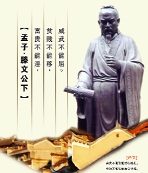 | What are the representative works in this period? From the late Spring and Autumn to the Warring States period, the essays were biased toward the discourse of the philosophers prose. Most literature works were inextricably linked to the active, representing different classes and interest ways of thinking. They presented various views on the formation of competing ideological and cultural fields. Confucian "Analects of Confucius", "Mencius", "Xunzi," Taoism's "I", "Zhuangzi" Legalist "Han Fei Zi", Mohist's "Mozi", as well as military commander of the |
"The Art of War." Early's "Analects" is a student-teacher Tanhua Lu, lively and free; "Art of War" is a military commander monographs, well constructed, well argued. The medium term "Mencius", "Mozi", using the dialogue form, are School collective works, multi-band split on the form. "Han Fei Zi" is a collection of essays by an individual scholar with the majority of chapters being center clear, coherent, logical, demonstration full and persuasive. Zhuzi essays focus on literary styles, widespread use of metaphors, each with its own personality style, to create a wide variety of style. Spring and Autumn period histories are very prosperous. During the Warring States Period the country has seen the chronological body "Zuo Zhuan", country body of the "national language", the body of "war policy" and so on. "Zuo Zhuan" to "Spring and Autumn" recorded by major as the key link, specific narrative of the Spring and Autumn Period describing 250 years of historical events, historical authenticity, the distinct trends of thought and language of imagery. "Mandarin" emphasis on words in mind, have a certain artistic aspect. "Warring States" described the history of the Warring States Period with clear narrative coherence and concentration. To summarize, the cultural debate, thoughts and ideas that predominated during the Warring States period gave rise to the "Hundred schools of thought contend", and were in large part responsible for pushing the development and popularity of future generations of Chinese literature, and for precipitating the birth of styles of prose, poetry, and odes in a manner that had never previously been seen. |